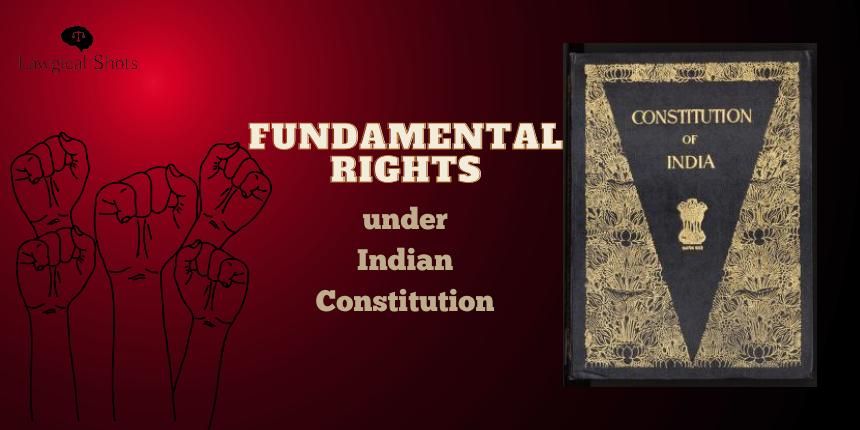In India, you can travel anywhere, speak your thoughts out, follow any religion, not be discriminated against, pursue any legal business, and so on. But where is the legal backing for all this? If we say that the Supreme Court has declared Right to sleep a fundamental right, what does that actually mean? The answer lies with part 3 of the Constitution of India which contains the fundamental rights. All the citizens and in some cases, even the non-citizens enjoy fundamental rights of Indian Constitution which nobody can take away unless expressly restricted. The six fundamental rights also contain remedies which can be understood through the Bollywood song “Sadda Haq Aitthe Rakh….Sadda Haq Aitthe Rakh”. It ensures that the fundamental rights are not a sham but enforced properly in case of any violation. So here, we are discussing the 6 Fundamental Rights under Indian Constitution which constitute its basic structure.
Fundamental Rights under Constitution of India
1. Right to Equality (Articles 14 to 18)
Article 14 of Constitution of India provides for the right to equality before law as well as equal protection before laws. It may be noted that the Article lays that “any person” enjoys the right to equality. In other words, every person including non-citizens enjoy the right to equality in India. Article 15 of the Constitution restricts the State from discriminating among citizens based on religion, race, caste, sex or place of birth. However, the provision makes an exception for special provisions for socially/educationally backward classes or those belonging to the Scheduled Castes or Tribes (SC/ST). The fundamental rights of Indian Constitution under Article 16 empower the citizens with an equality of opportunity in public employment/ government jobs, and also makes provisions for reservation.
In its essence, the right to equality under Articles 14 to 16 states that when it comes to laws, citizens as well as non-citizens are entitled to protection. While any of the citizens can get a government job, the State is empowered to make reasonable classifications. Article 17 of the Constitution forbids the practice of untouchability, while Article 18 abolishes the trend of titles, making military and academics an exception.
2. Right to Freedom (Articles 19 to 22)
Article 19 of the Indian Constitution entitles the citizens of India to freedom of speech and expression, peaceful assembly, freedom of association, to move freely within Indian territory, to reside anywhere in India, and to have any profession/occupation/trade. However, the State is empowered to impose reasonable restrictions on such freedoms to prevent any misuse. Article 20 of Constitution protects against self-incrimination (no one can be compelled to incriminate against themselves), double jeopardy (no one can be punished twice for the same offence) and and restricts the applicability of ex-post facto laws (penalties to be retrospective or prospective as beneficial for accused).
Article 21 of Indian Constitution grants the right to life and personal liberty to everyone regardless of citizenship, with an exception to the procedure established by law. Article 22 of the Constitution extends protection against arrest and detention in particular instances. It includes the basics for arrested person like being informed before detention, consultation with legal practitioner, production before Magistrate within 24 hours.
3. Right against Exploitation (Articles 23 and 24)
Article 23 prohibits human trafficking and forced labour in any form, and its contravention is punishable in law. The Article 24 of Constitution of India prohibits child labour, which means no child below 14 years can be employed in a factory/mine/any other hazardous employment.
4. Right to Religion (Articles 25 to 28)
The fundamental right of Indian Constitution under Article 25 provides right to conscience, profess, practice and propagate religion freely. Article 26 on the other hand extends the freedom to manage religious affairs, to establish and maintain religious institutions, own and acquire properties, and administer the said property. Article 27 grants freedom not to pay taxes while promoting a particular religion. That is why the income of priests in temples, churches, mosques, etc. is non-taxable. As per Article 28, there is freedom in terms of attendance at religious instructions or worship in educational institutions.
5. Cultural and Educational Rights (Articles 29 and 30)
Article 21A of the Constitution makes the right to education a fundamental right. Apart from that, Article 29 extends protection for the interests of minorities, based on residence, language, script or culture. Article 30 of the Constitution also gives the right for minorities to establish and administer educational institutions.
6. Right to Constitutional Remedies (Article 32)
While there are a variety of fundamental rights under the Indian Constitution, they will be of no use if there is no remedy to legally enforce and protect them. That is where the Article 32 of Indian Constitution holds an important pedestal. It lays the remedies for enforcement of rights conferred in Part 3 of Indian Constitution. Anyone can move to the Apex Court for enforcement of fundamental rights of Indian Constitution, and the Supreme Court in turn can issue appropriate directions in the form of 5 writs under Constitution. The importance of Article 32 can be understood in terms of Dr. BR Ambedkar who regarded it as the “heart and soul” of the Constitution.
Having understood the fundamental rights of Constitution of India, have a look at the Fundamental duties under Indian Constitution as provided under Part 4-A of the same.








